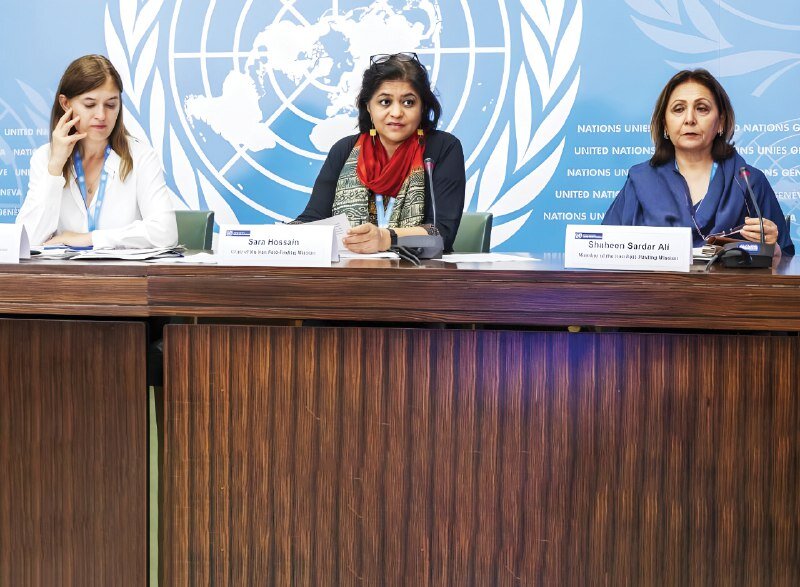Selective Human Rights
Fact-finding committees aim to amplify negative narratives on Iran

TEHRAN- Human rights have become a tool wielded by Western powers and fact-finding committees aim to amplify negative narratives on Iran.
The United Nations has recently released a report concerning the 2022 riots in Iran, igniting a firestorm of controversy.
Iran's High Council for Human Rights swiftly rebuffed the allegations made within the report, dismissing them as unfounded and politically motivated.
The report, purportedly the result of a UN fact-finding mission, accused Iran of egregious violations, including murder, imprisonment, torture, rape, and other forms of sexual violence, among other grave offenses, during the unrest fueled by foreign influences.
In response, Iran's High Council for Human Rights vehemently rejected the report, denouncing it as unreliable, illegal, and biased.
The council contended that the so-called fact-finding committee had produced a document devoid of substantiated evidence, laden with bias, and driven by political agendas.
According to the council's statement, the report lacked a legal foundation, was compiled in an unprofessional manner, and relied on unverifiable claims, all of which conveniently aligned with the interests of certain Western powers.
The council deplored the growing trend of politicizing human rights by Western nations, characterizing it as a dangerous escalation. It accused these countries of manipulating human rights mechanisms to advance their geopolitical objectives while concealing their true motivations.
Such actions, the council warned, not only jeopardize the integrity of human rights but also undermine faith in international mechanisms designed to safeguard them.
Furthermore, the council highlighted the questionable origins of the fact-finding mission, attributing its formation to lobbying efforts and political maneuvering by Western powers.
It singled out the German government for particular criticism, recalling its past involvement in arming Saddam Hussein's regime with chemical weapons, which resulted in immense human suffering for the Iranian populace.
In essence, Iran's High Council for Human Rights portrayed the UN report as a manifestation of geopolitical gamesmanship, orchestrated by Western powers with a history of exploiting human rights issues to further their agendas.
By exposing what it perceives as the report's inherent biases and ulterior motives, the council underscored the urgent need to safeguard the integrity of human rights discourse from political manipulation.
Unveiling fallacies in UN reports
In recent years, the activities of fact-finding committees have brought into focus the glaring issue of narrow focus and selective attention when it comes to human rights violations, particularly concerning Iran.
While Iran grapples with some challenges spanning various facets of society, these committees have predominantly fixated on women's issues, painting an incomplete picture of the country's human rights landscape.
This myopic perspective, however, isn't merely an oversight but rather a calculated maneuver by Western powers to wield human rights as a political cudgel against Iran.
The glaring disparity in the committee's approach becomes even more evident when juxtaposed with its conspicuous silence on the plight of women in Palestine.
The Gaza Strip, a crucible of suffering, has witnessed relentless Israeli aggression resulting in the deaths of nearly 30,000 Palestinians. Yet, the committee has turned a blind eye to this humanitarian catastrophe, choosing to ignore the egregious war crimes perpetrated by Israeli forces.
The full-scale siege of the enclave, coupled with rampant starvation and the tragic deaths of Palestinian children, paints a harrowing picture of systemic oppression and disregard for human dignity.
This raises pertinent questions about the committee's commitment to humanitarian principles. If its mandate truly extends to safeguarding human rights globally, why has it failed to address the ongoing atrocities in Palestine? What tangible steps has it taken to hold Israel accountable for its flagrant violations of international law?
Iran has opted to address its internal challenges through its own framework. Tehran recognizes that human rights discourse, in the eyes of the West, is often exploited as a pretext to exert pressure and advance geopolitical agendas.
By asserting its sovereignty in addressing domestic issues, Iran aims to insulate itself from external interference orchestrated under the guise of humanitarian concern.
It's evident that the selective invocation of human rights by the West reflects a broader pattern of geopolitical opportunism. Where Western interests align, human rights become a rallying cry for intervention and sanction; however, where such interests are absent, a deafening silence prevails.
This glaring double standard underscores the need for a more nuanced and principled approach to human rights advocacy—one that transcends geopolitical agendas and prioritizes the universal dignity and well-being of all individuals, regardless of nationality or political affiliation.
